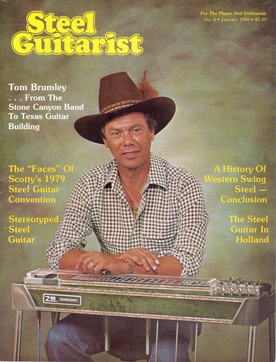
Chester Burton Atkins, known as "Mr. Guitar" and "The Country Gentleman", was an American musician who, along with Owen Bradley and Bob Ferguson, helped create the Nashville sound, the country music style which expanded its appeal to adult pop music fans. He was primarily a guitarist, but he also played the mandolin, fiddle, banjo, and ukulele, and occasionally sang.

Ernest Dale Tubb, nicknamed the Texas Troubadour, was an American singer and songwriter and one of the pioneers of country music. His biggest career hit song, "Walking the Floor Over You" (1941), marked the rise of the honky tonk style of music.

The pedal steel guitar is a console-type of steel guitar with pedals and knee levers that change the pitch of certain strings to enable playing more varied and complex music than other steel guitar designs. Like all steel guitars, it can play unlimited glissandi and deep vibrati—characteristics it shares with the human voice. Pedal steel is most commonly associated with American country music and Hawaiian music.

Paul V. Franklin is an American multi-instrumentalist, known mainly for his work as a steel guitarist. He began his career in the 1970s as a member of Barbara Mandrell's road band; in addition he toured with Vince Gill, Mel Tillis, Jerry Reed and Dire Straits. He has since become a prolific session musician in Nashville, playing on more than 500 albums. He has been named by the Academy of Country Music as Best Steel Guitarist on several occasions. He was inducted into the Steel Guitar Hall of Fame in 2000 and the Musicians Hall of Fame and Museum in 2019. With thirty, Franklin is the most nominated person in CMA history and is notable for having been nominated for the Country Music Association Award for Musician of the Year twenty nine times but has yet to win.
Roddis Franklin "Pete" Drake was a Nashville-based American record producer and pedal steel guitar player. One of the most sought-after backup musicians of the 1960s, Drake played on such hits as Lynn Anderson's "Rose Garden", Charlie Rich's "Behind Closed Doors", Bob Dylan's "Lay Lady Lay", and Tammy Wynette's "Stand by Your Man". Drake was inducted into the Country Music Hall of Fame in 2022, 33 years after his death.

Doug and Bucky is a jazz guitar duet album of standards by Bucky Pizzarelli and Doug Jernigan, released June 27, 2006.
Harold Bradley "Shot" Jackson was an American country guitarist best known for playing Dobro and pedal steel guitar. He also designed and manufactured guitars under the name Sho-Bud.
William "Bucky" Baxter was an American guitarist. He is best known as a member of Steve Earle and The Dukes and as a member of Bob Dylan's backing band in the mid-90s during the Never Ending Tour. He released his only solo album, Most Likely, No Problem, in 1999.
Harold Ray Bradley was an American guitarist and entrepreneur, who played on many country, rock and pop recordings and produced numerous TV variety shows and movie soundtracks. Having started as a session musician in the 1940s, he was a part of the Nashville A-Team of session players, which included pianist Floyd Cramer and pedal steel guitarist Pete Drake. He is one of the most recorded guitarists in music history.

Buddy Gene Emmons was an American musician who is widely regarded as the world's foremost pedal steel guitarist of his day. He was inducted into the Steel Guitar Hall of Fame in 1981. Affectionately known by the nickname "Big E", Emmons' primary genre was American country music, but he also performed jazz and Western swing. He recorded with Linda Ronstadt, Gram Parsons, The Everly Brothers, The Carpenters, Jackie DeShannon, Roger Miller, Ernest Tubb, John Hartford, Little Jimmy Dickens, Ray Price, Judy Collins, George Strait, John Sebastian, and Ray Charles and was a widely sought session musician in Nashville and Los Angeles.

Lloyd Lamar Green is an American steel guitarist noted for his extensive country music recording session career in Nashville performing on 116 No.1 country hits including Tammy Wynette's “D-I-V-O-R-C-E” (1968), Charlie Rich's “Behind Closed Doors” (1973), The Oak Ridge Boys’ “Elvira” (1981), and Alan Jackson's “Remember When” (2004). Green was a one of an inner circle of elite recording studio musicians known colloquially as the Nashville A-Team. In a career beginning in the mid 1960s and spanning a quarter-century, Green performed on more than 5000 recordings helping to create hits for scores of artists such as Charley Pride, The Byrds, Johnny Cash, The Monkees, Don Williams, Paul McCartney, Bob Dylan, and many others. His 1968 performance on the Byrds' landmark album Sweetheart of the Rodeo, influenced generations of non-mainstream country guitarists. He was featured on Ken Burns' Country Music documentary film in 2019. Green was inducted into the Steel Guitar Hall of Fame in 1988.
John Hughey was an American musician. He was known for his work as a session pedal steel guitar player for various country music acts, most notably Vince Gill and Conway Twitty. A member of the Steel Guitar Hall of Fame, Hughey was known for a distinctive playing style called "crying steel", which focused primarily on the higher range of the guitar.

Thomas Rexton Brumley was an American pedal steel guitarist and steel guitar manufacturer. In the 1960s, Brumley was a part of the sub-genre of country music known as the "Bakersfield sound". He performed with Buck Owens and the Buckaroos on hits such as "Cryin' Time" and "Together Again". His solo on "Together Again" received particular acclaim by critics. Brumley later spent a decade with Ricky Nelson and performed on "Garden Party" and the In Concert at the Troubadour, 1969 album.
Neil Lanny Flanz was a Canadian pedal steel guitarist who grew up in Montreal. In the mid-1960s he moved to Nashville and played on the Grand Ole Opry. He later lived in Florida and Austin, Texas. The Austin Chronicle dubbed Flanz' playing style as "country traditionalist". He is perhaps best known for his performance as a member of Gram Parsons' Fallen Angels. He played and toured for over 30 years with artists including Marcia Ball, Emmylou Harris, Charlie Louvin and Joe Sun. Flanz was inducted into the International Steel Guitar Hall of Fame in 2016.

William Lewis Byrd was an American country lead guitarist and studio musician who performed with Ernest Tubb, the Oak Ridge Quartet, Tex Ritter, George Hamilton IV, Jimmy Dickens and others. He helped to popularize the role of the electric lead guitarist in country music and, with fellow guitarist Hank Garland, was responsible for input into the design of the Gibson Byrdland guitar, named after parts of the names of both players.

JayDee Maness is an American pedal steel guitarist who is a veteran session musician in Los Angeles. He is known for his work with Gram Parsons, the Byrds, Buck Owens and the Buckaroos, Ray Stevens, Vince Gill, and the Desert Rose Band. Maness received The Academy of Country Music's "Steel Guitarist of the Year" award 18 times and was inducted into the Steel Guitar Hall of Fame in 2003.
Zane Beverly Beck (1927–1985) was an American steel guitarist and builder of pedal steel guitars. He is best known for his 1952 innovation of adding knee levers to the pedal steel guitar to alter the pitch of certain strings, a feature which has become a standard on all modern-day instruments. Other inventors had patented crude knee-operated devices as far back as 1933, but none were successful. Beck revolutionized the concept into a durable and reliable mechanism and was the first to put knee levers on production guitars. He became a member of the International Steel Guitar Hall of Fame (1991). As a musician, he performed on the Grand Ole Opry and Shreveport's Louisiana Hayride. Beck formed the ZB Music Company which manufactures steel guitars, later called BMI.

Jimmy Day was an American steel guitarist active in the 1950s and 1960s whose career in country music blossomed about the time the pedal steel guitar was invented after pedals were added to the lap steel guitar. He was a pioneer on pedal steel in the genres of Western swing and Honky tonk and his modifications of the instrument's design have become a standard on the modern pedal steel. Day's first job after high school was performing on the Louisiana Hayride as a sideman accompanying developing country artists including Hank Williams, Webb Pierce, Willie Nelson, Jim Reeves, Ray Price and Elvis Presley. He recorded and toured with all these artists and was featured on hit records by of many of them, including Ray Price's, "Crazy Arms" and "Heartaches by the Number". He was a member of Elvis Presley's band for about a year, but, along with fellow bandmate Floyd Cramer, resigned after Presley requested them to re-locate to Hollywood; instead, Day moved to Nashville to work as a session player and Grand Ole Opry musician. He was a member of the Western Swing Hall of Fame (1994) and the International Steel Guitar Hall of Fame (1999). Day died of cancer in 1999.

The Oahu Music Company was a music education program in the United States during the 1930s and 1940s to teach students to play the Hawaiian Guitar. Popular culture in America became fascinated with Hawaiian music during the first half of the twentieth century and in 1916, recordings of indigenous Hawaiian instruments outsold every other genre of music in the U.S. By 1920, sales of Hawaiian guitars and instruction had become well established and Oahu Music Company was the leading purveyor of these programs. The organization canvassed nearly every city in the United States, often door-to-door, selling both their Oahu-brand instruments and lessons for young people to join their weekly classes.
The Steel Guitar Hall of Fame is an organization established in the United States in 1978 to recognize achievement in the art of playing the steel guitar. The organization's stated purpose is:
To establish a Hall of Fame and Museum to support the art, popularity, and prestige of the steel guitar, to honor those musicians and composers who have made significant contributions to the steel guitar world, and to educate the public regarding the steel guitar.












